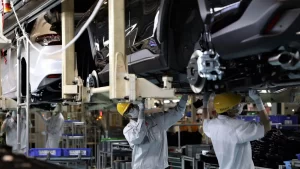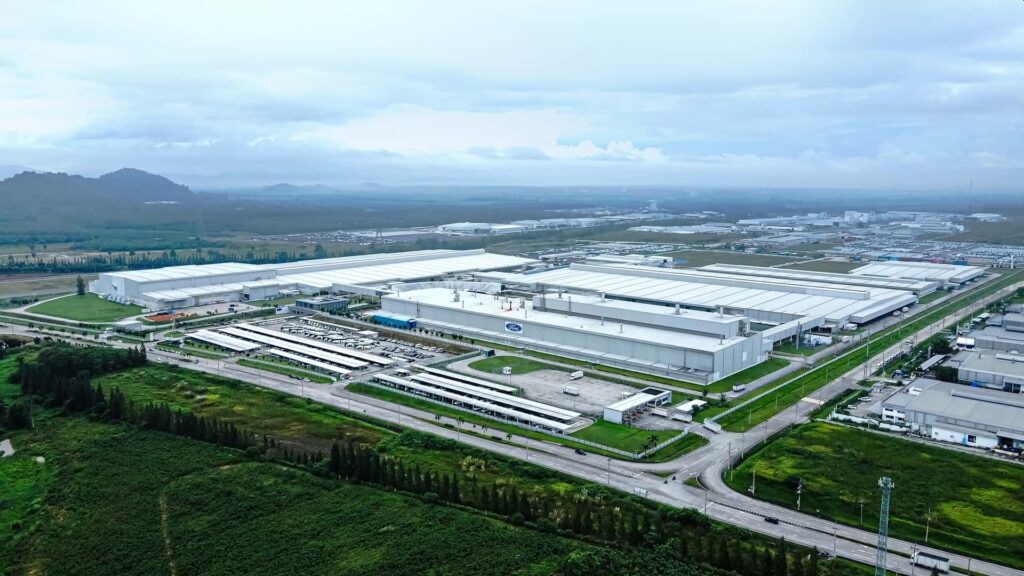
Thailand’s Automotive Industry Faces Headwinds Amid EV Transition and Economic Challenges
Thailand’s automotive sector, long considered Southeast Asia’s manufacturing hub, is navigating a complex landscape of challenges and opportunities in 2025. The industry has recorded its 20th consecutive month of production decline in March, with output contracting by 6.1% year-over-year to 129,909 units, following a steeper 13.62% drop in February.
Production and Sales Trends
The Federation of Thai Industries (FTI) has signaled that the country may miss its 2025 car production target of 1.5 million units, with expectations now falling below 1.4 million vehicles. This downward trend reflects both domestic economic pressures and international market uncertainties.
Domestic car sales showed modest signs of stabilization in March, declining by just 0.54% year-over-year to 55,798 units, a significant improvement from February’s 6.68% decline. Surapong Paisitpattanapong, spokesperson for the FTI’s automotive division, described this as “a very good figure” considering current economic conditions.
By manufacturer, March sales revealed mixed performance:
Toyota maintained its market leadership with 21,575 units (unchanged from last year)
Honda declined 3.8% to 7,909 units
Isuzu dropped 17.4% to 7,320 units
BYD surged 183.0% to 3,204 units
Mitsubishi fell 6.3% to 2,823 units
For the first quarter of 2025, overall vehicle sales reached 153,193 units, representing a 6.5% year-over-year decline. The drop in sales has been particularly pronounced in the pickup truck segment, traditionally a backbone of Thailand’s automotive market.
Export Challenges
Thailand’s position as a key export base for global automakers is under pressure. Vehicle exports decreased by 14.9% year-over-year in March to 80,914 units, with the first quarter showing an 18.6% decline to 220,139 units. Export value in March reached 57.4 billion baht, down 15.5%.
A significant factor contributing to this decline is the implementation of a 25% tariff on foreign-made automobiles exported to the U.S., which took effect on April 2, 2025. Additional duties on auto parts are expected by May 3, creating further headwinds for Thailand’s export-oriented automotive industry.
EV Market Growth Amid Overall Decline
Despite the overall industry downturn, Thailand’s electric vehicle market is projected to grow by 40% in 2025, potentially surpassing 100,000 units according to the Electric Vehicle Association of Thailand (EVAT). This growth follows an 8% decline in EV sales last year and positions Thailand to maintain its status as Southeast Asia’s largest EV market.
The Thai government has implemented several measures to support the EV sector, including subsidies of up to 150,000 baht for locally produced electric vehicles and tax incentives requiring local production for eligibility. Recently approved lower tax rates for plug-in hybrid EVs (PHEVs) will take effect on January 1, 2026.
Chinese automakers have established a significant presence in Thailand’s EV landscape, with BYD, Great Wall Motor, and SAIC Motor-CP (MG) all operating production facilities in the country. BYD’s sales surge of 183% in March highlights the growing consumer interest in Chinese EV brands.
Economic Factors and Industry Outlook
The automotive industry’s struggles reflect broader economic issues facing Thailand, including high household debt limiting consumer purchasing power, slow economic growth, rising living costs, and cautious lending practices by financial institutions. Car loan rejection rates have reportedly reached 70%.
Industry stakeholders are hoping that the Bangkok Motor Show 2025 will inject some momentum into the market. The event recorded over 70,000 vehicle bookings, with Toyota alone receiving more than 21,000 bookings nationwide during the show period.
While the recent interest rate cut by the Bank of Thailand might offer some relief, industry experts suggest that a meaningful recovery will depend on broader economic improvements and increased consumer confidence. The transition to electric vehicles presents both challenges and opportunities for Thailand’s automotive sector as it works to maintain its position as Southeast Asia’s automotive hub while adapting to changing global market dynamics.


